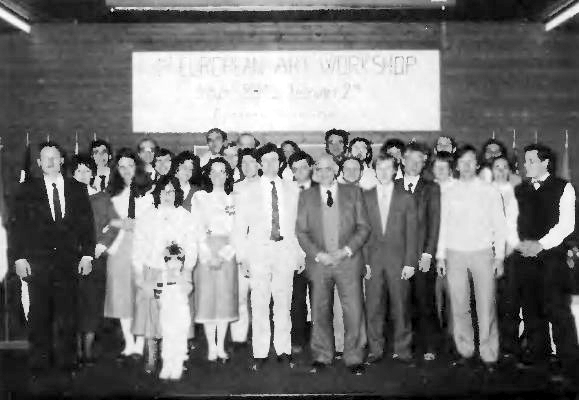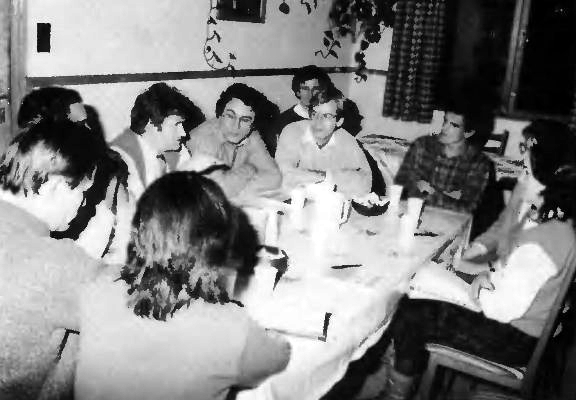![]()
The Words of the Davies Family
|
|
The Words of the Davies Family |

On
the final day of the Arts Workshop, the participants pose for a group
picture.
This year motto is "the Creation and Building of the Kingdom of Heaven: Can you imagine the Kingdom of Heaven without art?"
With these uplifting words Rev. Young Whi Kim, regional director of Europe, related the First European Arts Workshop directly to True Father's providence in 1986. Before Rev. Kim spoke, Karl Leonhardtsberger, national leader of the German Unification Church, opened the workshop by saying that "God is the greatest artist:' Speaking with passion and energy he asserted that the artist is the true adventurer, the true Christopher Columbus of today, the one who opens our senses to new lands. But to do this he must himself first pioneer the way, and this takes indemnity. Art must be rooted in true love, he said. Only then can it have eternal value and fulfill its purpose, which is to communicate joy and give praise to God and our True Parents.
Rev. Kim poetically explained how art is the flower of culture -- and that man cannot live without culture. True art is the substantiation of God's love. In the world of computers we need hardware and software. The Unification Church creates the hardware for the Kingdom of Heaven: perfected men and women. Art is the software. As artists we must do two things at once: perfect ourselves as God's children, and express joy in our art. Rev. Kim concluded that art is the content of the Kingdom of Heaven.
All the workshop participants were moved by these powerful proclamations, inspiring us to action and filling us with an incredibly optimistic spirit, which stayed with us throughout the whole workshop.
"The Theory of Art" as explained in Unification Thought was presented to us by Ulrich Tuente. In his clear and heartistic lecture, he expressed that the relationship between the theory of art and art itself could be likened to the relationship between theology and religion; while theory might not give inspiration in itself, it does systematize the artistic process, and thus gives us a basis for evaluating art. Ulrich concluded that to connect with the heart of God we must connect with the purpose of God. If art is to have eternal value it must relate to God's purpose. It is not the ingredients of art that determine its value, but its purpose.
Hans Campman, a founding member of the Go World Brass Band (GWBB) in Europe, divided his talk "Music and Our Way to Canaan" into two parts: 'Art as Prayer" and "Music and God's Kingdom:' He expressed the opinion that perhaps the main reason for Beethoven's greatness was the fact that his music had movement and direction. Hans said, "The greatness of your music is determined by how much it can express dynamic growth True music, in the process of restoration, has a function similar to prayer -- it aids in the recreation of our spirit, our true self. Our music should express God's sorrow, longing, and hope, leading to a breakthrough and the joy of victory. Music criticism, while it should not ignore details, should be concerned mainly with the whole experience of the listener. Hans felt that the Old Testament was primarily represented by the word, and that music only really developed in the New Testament era. The Completed Testament will see the development of dance. It is significant that the first arts group founded by Father was the Little Angels.
Karl Leonhardtsberger, in his Thursday morning lecture "God, Art, and Creativity:' related how art had been his main source of inspiration before the Unification Church." God gave me art to be able to escape from the old world:' he said. Just as we need to praise our husbands or wives if we are to keep our marriages truly alive, art should be our way of giving praise to God and revitalizing our relationship with Him. Love always finds its shape. God created the physical world, but man must make a substantial contribution in creating the contents of the spiritual world by our love. The ancient Chinese knew that bad music could destroy a nation. With true art we can build a nation.
Karl expressed his feeling that art is very powerful and vital to our work in restoration.
Makoto Kinoshita, also a founding member of the European GWBB, talked on "Performing Arts and the Dispensation' specifically in relation to the history of the GWBB. Father had stated that the donation of instruments for the creation of the band was an important feature of the providence in 1978. Even though there is only one small GWBB active in Europe now, Makoto feels that the development of the GWBB has absolute value for God's dispensation.
In his lecture "The Value of Art Today." Otto Waldner presented a slide show of fine art from the ninth to the fifteenth centuries, showing the transition from high religious consciousness to the more humanistic approach of the Renaissance. In a second slide show he explained how he himself tries to express spiritual values in his sculpture. His current project, "The Tree of Life is to be erected in Seoul, Korea, and will eventually be 21 meters high.
Thirty-six brothers and sisters attended the workshop, although some were unable to stay the whole week. But there were some who had only intended to observe for a couple of days and ended up staying all the way to the farewell banquet!

Many
issues pertaining to the arts were brought up in the discussion
groups.
In addition to the main lectures there were shorter presentations from other participants. Wolfgang Zewe reported on the activities of the Viennese Youth Choir and played some of their recordings. Michael Waldenmeier recounted how he became a member of the opera choir in Wiesbaden, which he undertook as a result of a suggestion from Father. The Go World Brass Band gave an audio-visual presentation of its work, as did Blue Tuna, a rock band affiliated with CARP. Siegfried Pracher talked about the establishment and successful development of the GWBB Sound and Video Studio in London.
I also gave a summary of my various activities in the arts field: producing records, slide shows, and video lectures; writing and performing songs and poetry; managing and promoting artists and a small cabaret; doing publicity work for the film Inchon; and writing for various publications including The World and I. In my talk I likened the role of the artist to that of the shaman in preliterate societies; he was the spiritual leader of the people. I introduced various activities that help in the development of "right brain" activity, which generates art and in the grounding of one's inspiration in physical reality.
From Germany and Austria we had representatives who are working directly in the field of fine arts. Josef Blassnig talked about his wood carving, and Christian Sedlmeier presented a talk about his own drawing, painting, and restoring of old and damaged paintings. Wolfgang Schuler, a brilliant portrait painter, was particularly interested in explaining how he witnesses through his art gallery, magazine, and cultural association. The works they showed us in photographs were unbelievably beautiful.
Throughout the week various discussion groups were held, and there was also plenty of time for informal discussion and reflection. A number of us watched and were very inspired by a film about the making of the USA for Africa song, "We Are the World." Sepp Wandl's coordination kept our daily schedule flowing smoothly and calmly, and Peter May's "artistic" abilities came to the fore in his much-praised preparation of the cuisine of different countries. The workshop was also memorable for the good cooperation between participants and staff in all the various activities.
Friday night's talent show flew by, and it was well after midnight when we finished singing and dancing to innumerable choruses of "We Are the World:' followed by three impromptu, resounding Manseis.
Gerhard Bessell's Sunday sermon movingly expressed the need for us to connect a life of art with our life of faith and mission. The spirit was so high that one member, who had been struggling at the start of the week, said we could have sung from the beginning of the holy song book right to the end. We nearly did! The sense of God's presence was intensified by the showing of a video recording of a special event held on January 3 in London: Jesus and Heung Jin Nim spoke to the members through the medium of our sister Faith Jones. Earlier in the week we had also received a precious testimony about the True Family from Otto's Korean wife, Mrs. Joo Hwa Kim-Waldner, who had taught piano to the elder True Children.
In the closing address, Otto exhorted us to try to understand and embody the Korean heart, the heart of the fatherland. I endorsed this also, expressing our deep gratitude, as many had done throughout the week, to Rev. Kim for his enthusiastic support for this initiative.
The participants decided to appoint a committee to plan future activities in the visual and performing arts. We also decided to create an arts newsletter. The majority of the participants expressed their firm commitment to future workshops, and we are looking toward the development of major conferences for artists along the lines of CAUSA or ICUS.
It was trumpets that brought down the walls of Jericho. It was through the writing on the wall that God pronounced judgment on Belshazzar, king of Babylon. It was through painting and stained glass windows that people were educated about Jesus. We are the spiritual inheritors of this tradition, and judging by the testimonies of spiritual rebirth from the brothers and sisters in this historical workshop, it seems that, in the words of one of our brothers, "we have awakened a sleeping giant."
"As an artist I work by myself. Being together and sharing with brothers and sisters was for me the deepest experience I have had with God for many years."
"The Arts Workshop was a rebirth experience for me. Something deep within me came to life again!"
"It was very meaningful for me as a Japanese to participate in this first European Arts Workshop. Before, I felt it was my duty to learn about European culture and history. Now I feel the desire to study coming from within myself. I can understand and respect European culture much more now, and I am thankful for that."
"We are really making history here. I feel it is a new renaissance for European arts and culture. As Father said, we need a new cultural revolution."
"I felt the maturity of everyone participating in this workshop. Each one of us already went through a long and lonely path being both a Moonie and an artist. For the first time we have been able to come together and share. I have never experienced a workshop in which everyone so inspired that they wanted to contribute and say more."
"I am very grateful for the last eight years of the Performing Arts mission that started in England with Father's vision. Throughout the years the bands grew smaller rather than bigger; but now this meeting has brought our hopes back to life again and helped us feel that our many years of investment and struggle were not in vain."
"We pledge every Sunday about one culture centered upon God. Now for the first time I feel there is room for this one new culture. I feel myself spiritually at home again, after so many years."